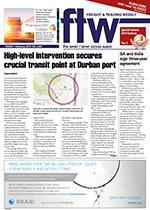Free trade in Africa is still a long way off despite expectations that the African Continental Free Trade Agreement (AfCFTA) will be implemented this year. With 18 ratifications already confirmed only four more are required for the AfCFTA to enter into force. “All indications are that the required number of ratifications will soon be reached,” said Professor Gerhard Erasmus, founder of Tralac. Addressing the Exporters’ Club Western Cape last week, he said this could happen as soon as May this year as several countries had indicated they would be depositing their instruments of ratification within the next few months. Chad, Congo, Côte d’Ivoire, Djibouti, Eswatini, Ghana, Guinea, Kenya, Mali, Mauritania, Namibia, Niger, Rwanda, Senegal, Sierra Leone, South Africa, Togo, Uganda have all either deposited ratifications or have ratifications pending. The agreement comes into force 30 days after the 22nd instrument of ratification has been deposited. “This, however, does not mean that goods and services will be traded under the new preferential rates and market access provisions for the AfCFTA because the Protocols on Trade in Goods and Trade in Services are still being negotiated,” said Erasmus Completing that process by May or even December was a near impossible task considering the complexity, he said. “We are at a very critical juncture in the conclusion of this agreement. There is a lot of diplomatic and political support for the AfCFTA,” said Erasmus. “Politicians and diplomats want to demonstrate the high level of unity, commitment and acceptance of legal obligation in the agreement, but that contains a danger. That is that the formalities of the agreement are emphasised and not so much the substance.” According to Erasmus, whilst the founding umbrella agreement has been completed along with the very broad and general principles of it all, the fact that there is no schedule on tariff commitments and no annex on rules of origin is very concerning. “We need to be a little bit sceptical and sober. We are going to see a very unique African achievement,” he said. “We are going to ratify an agreement that has in fact not been finalised.” He said any announcement that the agreement was coming into force would not affect trade at all as it simply could not be free until the negotiations were complete. “Normally agreements are negotiated until everything is completed and there is overall agreement. That text is then signed and taken by participating governments through their national procedures. Once this is done the country deposits its instrument of ratification.” Erasmus said in the absence of a legal instrument on how countries would lower their tariffs – or even remove them as is the ultimate goal of the AfCFTA – as well as in the absence of rules of origin, trade would continue across Africa as it is at present despite the agreement being in force.
CAPTION
In the absence of a legal agreement on how countries will lower their tariffs, trade will continue as it is. – Gerhard Erasmus

